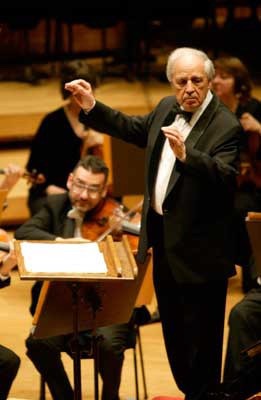Boulez, CSO open year with compelling Bartok and ravishing Ravel

Perhaps it was the tough weather or a Chicago Symphony Orchestra program dominated by rarities, or both, that accounted for the rows of empty seats Thursday night at Orchestra Hall.
No matter, for those who braved the elements were treated to a compelling, supremely well played program led by Pierre Boulez, in the CSO’s lead-off event for the month-long salute to its conductor emeritus.
Walking briskly on stage, the spring in the French composer-conductor’s step belied the years of a man on the verge of his 85th birthday. Characteristically, Boulez seemed ill at ease with the enthusiastic ovations that greeted him, and eager to mount the podium and get down to the musical business at hand.
Music of Ravel has figured prominently in Boulez’s repertoire from his early years and the performance of Le tombeau de Couperin that led off the evening showed the partnership between the CSO and its long-time principal guest conductor at its finest. Retooled from the composer’s piano suite, Le tombeau was conceived with wartime nationalistic intent, but in the wake of the horrors Ravel witnessed as a truck driver in World War I, become more of a wistful meditation on France’s musical past.
Even by the standards of this partnership, the Ravel performance was extraordinary. If there was a hint of metrical rigidity in the Forlane, the vernal freshness and delicacy of the playing under Boulez more than made up the balance. The hazy evanescent expression of the Menuet was wonderfully evocative, with meticulous balancing of brass and winds, and the jaunty elan of the concluding Rigaudon rounded off the performance delightfully, the ars antiche quality of the central section with oboe against plucked strings surely etched. Eugene Izotov’s poetic oboe solos were magnificent, bringing out the gentle whimsy and half-tones of the music with equally responsive and atmospheric playing by the entire CSO.
From Couperin’s tomb to Bluebeard’s castle. Bartok’s one-act opera is a strange and static work, the scenario less concerned with the actions of the notorious serial monagamist who dispatches several wives in succession than as a psychological dual between Bluebeard and his newest spouse, Judith. The frightened but obsessed Judith continually beseeches Bluebeard for the keys to his seven doors, which reveal a torture chamber, an armory, vast treasures, a garden and finally his previous wives who are kept alive, enshrined in a kind of transfigured bondage.
With its talky, repetitive libretto and lack of stage action, Bluebeard’s Castle seems more suited to the concert hall than the opera house, especially given the kind of commanding and atmospheric performance presented Thursday night.
As the male protagonist in this weird operatic co-dependency, Falk Struckmann was an imposing Bluebeard, his dark, resonant bass bringing power to the climactic moments. Michelle DeYoung didn’t always project firmly over the orchestra, but the mezzo-soprano brought an expressive warmth and sensitive dramatic engagement to Judith’s conflicted emotions.
Under Boulez’s scrupulously attentive direction, the playing of the orchestra was sensational across the board. The ingenuity and audacity of Bartok’s scoring was consistently manifest, from the wild percussion and muted brass of the torture chamber to the jauntily ironic brass fanfares of the armory and the jewels, painted in luminous celesta and harps. The massive repeated chords of Bluebeard’s kingdom brought overwhelming sonic power from the large full orchestra, yet balanced with characteristic refinement and transparency by Boulez.
This week it was learned that Mathieu Dufour, who was reported to join the Los Angeles Philharmonic, was in fact staying in Chicago. The welcome news was apparent in the warm applause from colleagues and the audience that greeted the CSO’s principal flutist in the evening’s centerpiece, Marc-Andre Dalbavie’s Flute Concerto.
Written in 2006 for Emmanuel Pahud, Dalbavie’s concerto is cast in a single unbroken movement. While it has no lack of edgy bite or restless pulsing, Dalbavie is less concerned with a dramatic dual between soloist and orchestra than an expressive confluence between the two sides. Unlike the French composer’s more vertical, stacked style, here the emphasis is on forward momentum and overlapping lines, in music that deconstructs traditional flute tropes while exploring new combinations and effects.
Even in its anti-Romantic idiom, the concerto calls upon a full arsenal of technical demands, which Dufour’s polished, bravura virtuosity surmounted with seamless ease and expressive poise, bringing out the unsettled qualities as well as the fleeting lyricism. Boulez and the orchestra provided equally assured support.
The program will be repeated 1:30 pm. Friday, 8 p.m. Saturday and 7:30 p.m Tuesday. www.cso.org; 312-294-3000.
Posted in Performances




